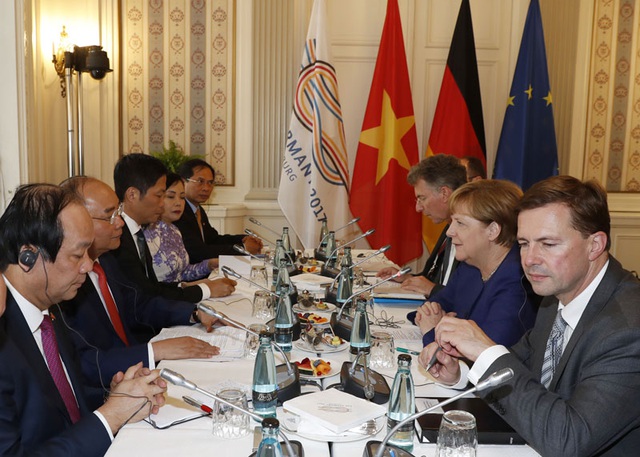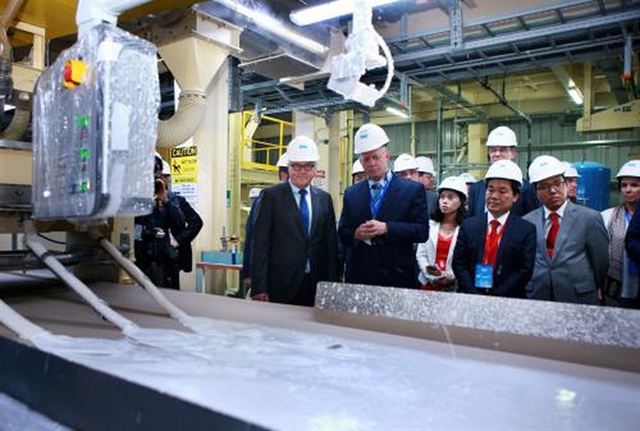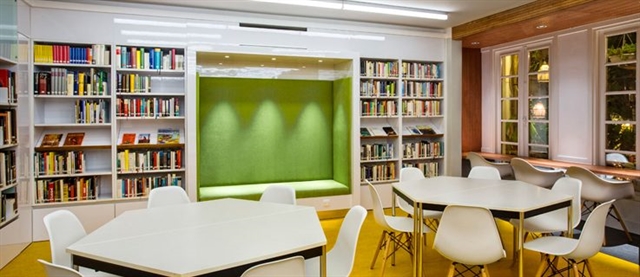 Politics & Law
Politics & Law

September 23 marks 45 years of diplomatic ties between Việt Nam and the Federal Republic of Germany. During that time, the bilateral strategic partnership has been deepened in all fields among which economic, trade and investment co-operation are important pillars.

|
| Vietnamese Prime Minister Nguyễn Xuân Phúc and German Chancellor Angela Merkel hold talks in Hamburg during Phúc's visit to Germany in July 2017 to attend the G20 Summit. — VNA/VNS Photo Thống Nhất |
HÀ NỘI — September 23 marks 45 years of diplomatic ties between Việt Nam and the Federal Republic of Germany.
During that time, the bilateral strategic partnership has been deepened in all fields among which economic, trade and investment co-operation are important pillars.
Germany has been one of the most important European partners of Việt Nam for many years.
German Ambassador to Việt Nam Guido Hildner told Việt Nam News that the relationship between Việt Nam and Germany is very good. It has been intensified over recent years. In 2011, both governments entered into a strategic partnership, with major areas of cooperation, for instance, including the sectors of the environment, energy and vocational training.
"In the year 2020, we have seen very intensive corporation in the international and multilateral arena. Both countries are members of the United Nations Security Council and Việt Nam is chairing ASEAN and Germany holds the presidency of the European Union Council," he said.
The trust and mutual understanding between the two countries have been strengthened through the maintenance of high-level delegation exchanges and co-operation mechanisms.
During the visit to Việt Nam by German Chancellor Angela Merkel in October 2011, prime ministers of the two countries signed the Hà Nội Joint Declaration on the establishment of a strategic partnership, which set out objectives and measures to enhance co-operation in prioritised areas.
After the declaration, the two countries regularly conducted delegation and high-level exchanges, creating a driving force for co-operation.
The most recent exchanges conducted by Vietnamese leaders were visits by Prime Minister Nguyễn Xuân Phúc in July 2017 and Deputy Prime Minister, Foreign Minister Phạm Bình Minh in February 2019.
Federal Economic Minister Peter Altmaier visited Việt Nam in March 2019, following the visit made by German Foreign Minister Frank-Walter Steinmeier in October 2016.
The Communist Party of Việt Nam and the German Social Democratic Party (SPD) have an annual theoretical dialogue mechanism. The fifth theoretical dialogue took place on November 15, 2016, in Hà Nội and the sixth took place from July 2-7, 2017 in Berlin. The Communist Party of Việt Nam held dialogues with the leftist Party in Germany in April 2019.

|
| Frank-Walter Steinmeier, foreign minister of Germany, visits a factory at Đình Vũ Industrial Park in Hài Phòng City during his trip to Việt Nam in October 2016. VNA/VNS Photo Lâm Khánh |
Big trading partner
Germany is currently Việt Nam's largest trading partner in Europe, accounting for nearly 20 per cent of Việt Nam's exports to the EU,
It is also an important gateway for Vietnamese goods to enter other markets in Europe.
The two-way turnover in 2019 reached more than US$10.25 billion with Việt Nam mainly exporting phones, computer components, textiles, footwear, coffee, agricultural products and importing machinery, equipment, spare parts, means of transport, cars, chemicals, pharmaceuticals and dairy products.
In terms of investment, as of August 2020, Germany has 370 valid projects in Việt Nam with registered investment capital of nearly $2.1 billion, ranking 18th out of 137 countries and territories investing in Việt Nam
Most of the German projects focus on processing and manufacturing industries; electricity, gas production and distribution; wholesale, retail in big cities like HCM City, Ninh Thuận, Đồng Nai, Hà Nội, Thanh Hóa, Quảng Nam.
There are about 300 German businesses operating in Việt Nam, including a number of multinational corporations, such as Siemens, B. Braun, Messer, Mercedes-Benz, Bilfinger and Bosch.
Việt Nam now has 30 valid investment projects in Germany with a total investment capital of $120.6 million. Vietnamese businesses invest in Germany in the fields of finance and banking, wholesale and retail, cars, motorbikes, catering and accommodation services, real estate, informatics, and commerce.
In addition to direct investment, Germany is one of the countries that grant Official Development Assistance (ODA) to Việt Nam with a large number and high frequency. Since 1990, Germany has provided about $2 billion of ODA to projects in Việt Nam through technical and financial co-operation.
The German Government has committed to supporting Việt Nam through a number of other co-operation programmes, such as non-refundable loans from the Energy and Climate Fund (EKF), the Green Climate Fund (GCF) and development loans under the Initiative for Climate and Environmental Protection (IKLU).
Effective co-operation in various sectors
Not just in the economic sector, Germany is also one of the most important partners of Việt Nam in vocational training.
The European country has assisted the Vietnamese Ministry of Labour, Invalids and Social Affairs to develop a national vocational training strategy, draft the Law on Vocational Training, and set up models of vocational schools in some localities following the very successful German model.
Germany is also considered one of the most important markets for Vietnamese tourism with the number of visitors increasing steadily each year. The number of German tourists to Việt Nam reached 199,000 in 2017 and approximately 214,000 people in 2018.
From July 1, 2015, Việt Nam piloted visa exemption for German citizens for a period of 15 days.
In cultural co-operation, in 1997, Germany established the German Cultural Centre, also known as the Goethe Institute in Hà Nội where German cultural introduction and Germany teaching activities are regularly organised.

|
| Library of the Goethe Institute in Hà Nội. Photo courtesy of the institute |
In education and training, about 300 Vietnamese postgraduates are doing research in Germany under the scholarship programme.
About 4,600 Vietnamese students are studying at German universities.
The two countries established Việt Nam-Germany University in September 2008 in HCM City which operates under the model of German University, with the support from Hessen State and the German Academic Exchange Service DAAD.
The relationship between the two countries has also been fostered in science, technology, defence and exchanges between localities.
The Vietnamese community in Germany currently has 176,000 people, of which 20 per cent has German citizenship. In general, expatriates in Germany have a relatively stable life, mostly earning from paid jobs or small businesses.
The Vietnamese people in Germany have formed community groups and associations such as the Association of Vietnamese Compatriots, the poetry-literature club and the charity society.
Several German states have started introducing the Vietnamese language in the general curriculum. — VNS




